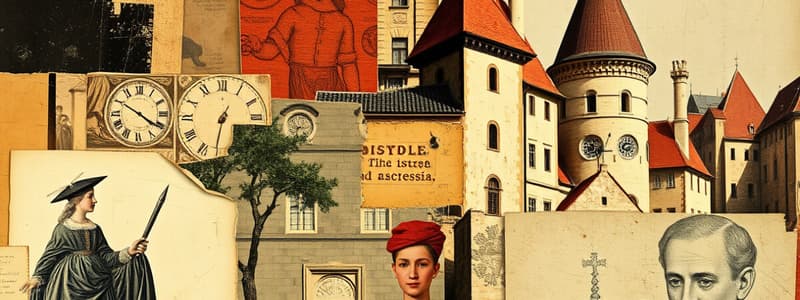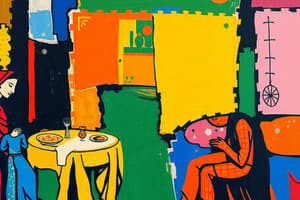Podcast
Questions and Answers
What was the Holy Roman Empire?
What was the Holy Roman Empire?
Loose federation of mostly German states and principalities, headed by an emperor elected by the princes.
What was Flanders known for during the Middle Ages and Renaissance?
What was Flanders known for during the Middle Ages and Renaissance?
An important industrial and financial center of northern Europe.
What significant historical event began in England?
What significant historical event began in England?
The Industrial Revolution
What is the significance of the Ottoman Empire in relation to the Age of Revolutions?
What is the significance of the Ottoman Empire in relation to the Age of Revolutions?
What characterized the Italian City States during the Renaissance?
What characterized the Italian City States during the Renaissance?
What is the significance of the Holy Land in historical trade?
What is the significance of the Holy Land in historical trade?
What event marked the end of the Reconquista?
What event marked the end of the Reconquista?
What is France known for?
What is France known for?
What did Christopher Columbus achieve by sailing the Atlantic Ocean in 1492?
What did Christopher Columbus achieve by sailing the Atlantic Ocean in 1492?
Flashcards are hidden until you start studying
Study Notes
Holy Roman Empire
- A loose federation of mostly German states and principalities.
- Headed by an emperor elected by princes.
- Existed from 962 until 1806.
Flanders
- A region containing parts of modern-day northern France, Belgium, and the Netherlands.
- Became an essential industrial and financial center of northern Europe during the Middle Ages and Renaissance.
England
- Known as the birthplace of the Industrial Revolution.
- A key player in European history throughout the ages.
The Ottoman Empire
- Once part of the Roman/Byzantine legacy which migrated to Italy, aiding the Renaissance.
- Disintegration during the Age of Revolutions led to Serbia, Greece, and others achieving independence.
- Ancient Greek culture contrasts with the modern nation-state of Greece.
Italian City States
- Italy was not yet unified; consisted of various states.
- Included the Kingdom of Naples, Papal States, Republic of Florence, Duchy of Ferrara, Republic of Genoa, and Republic of Venetia.
- Represented diverse economic, political, and cultural centers in the region.
The Holy Land
- Historical site of many Crusades (11th-13th centuries).
- Trade and ideas from this region enriched Europe, introducing Arabic numerals, the concept of zero, and advancements like the astrolabe.
- Influenced the development of experimental science and the Scientific method.
The Reconquista
- Concluded in 1492 with King Ferdinand and Queen Isabella defeating the last Islamic Kingdom in Spain.
- Resulted in the expulsion of Jews and facilitated direct trade routes to Asia.
- Associated with colonialism and forced conversions in Latin America, linked to the Jesuits' educational efforts.
- Notable for the failed 1588 Spanish Armada attempt to invade Protestant England.
France
- A significant European nation with a rich history.
- Continues to play an important role in global affairs.
The Atlantic Ocean
- Christopher Columbus crossed this ocean in 1492, marking the beginning of significant exploration.
- Led to European wealth, colonization of the Americas, and longstanding racial, ethnic, and economic divisions.
- Initiated the Columbian Exchange, influencing diets and economies globally, and brought serious consequences like genocide and disease.
Studying That Suits You
Use AI to generate personalized quizzes and flashcards to suit your learning preferences.




